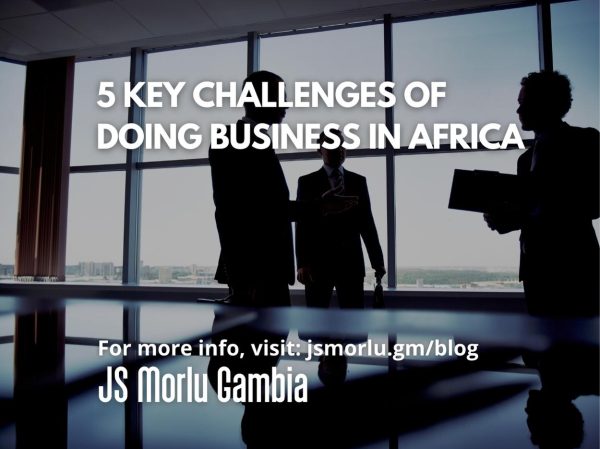Africa is the second-most populous and second-largest continent after Asia, with tremendous economic potentials. The continent is one of the world’s fastest-growing regions and welcomes business investment with rewarding opportunities. With an estimated $6.7 trillion in business and consumer spending and over 1.7 billion people, Africa is a prosperous region for global businesses. But Africa is not without challenges, especially in the business sector.
This article focuses on the critical challenges of doing business in Africa. In writing this article, we consulted reliable sources such as the World Bank, Africa Energy Portal, The Guardian, Energy Capital Power, etc.
1. Finding Skilled Labor
According to The Guardian, the failure of the world to help Africa tackle labour shortages will adversely affect global business. The continent’s labour shortage and the lack of skilled professionals affect companies scaling their operations. Despite a young population, skilled labour is short in Africa because many countries misalign training and schooling programs. Furthermore, low education budgets and weak educational systems failing to nurture skills for the labour market are other reasons.
According to EG Scholars, Niger, Burkina Faso, Mali, Central African Republic, and Ethiopia are the leading countries with the worst education system in 2022. So if you’re looking to start a business in Africa, consider attracting talents by providing support and offering on-the-job training. Africa has a highly educated population capable of exceeding at any job with the proper training. Besides, encouraging staff with the potential to learn new skill sets will help your business bridge the skilled labour shortage.
2. Electricity
According to Africa Energy Portal, despite improvements from different governments, electricity remains a major challenge in the region. With over 600 million Africans without access to electricity, the continent needs a significant scale-up in electricity investment. Electricity is critical for businesses to control the cost of energy and production.
Many companies operate industrial machinery and motors, ventilation, office equipment, lighting, and facility heating that require electricity to generate revenue. The lack of electricity access limits the quality of life, provision of public services, and modern economic activities in Africa. Insufficient supply often leads to loss of productivity and revenue shortage for companies.
Despite the electricity challenge, focusing on African countries making giant strides in the sector is essential. According to Energy Capital Power, Egypt, Morocco, Tunisia, Algeria, and Gabon will be Africa’s most electrified countries in 2022. Consider renewable energy alternatives and how to collectively or individually fund them before starting a business in Africa.
3. Supply Chain Challenges
According to Defense Web, Africa has unique supply chain challenges with its population and sheer size. In addition, the continent has a weak infrastructure, and movement between countries can disrupt your business supply chain. It isn’t easy to facilitate face-to-face business transactions, but transferring goods to the end consumer in Africa is also challenging.
Many African companies became creative with moving goods due to supply chain and transportation barriers. For example, companies like Dangote and Coca-Cola have armies of entrepreneurs biking and walking products to the end consumer. If you want to lay and successful business foundation in Africa, consider approaching innovative ways to bridge the supply chain gap. Partnering with local service providers and communicating and optimizing inventory are other ways to approach the distribution challenge.
4. Regulations and Government Policies
According to African Liberty, regulations and government policies hinder African business growth. Governments create principles and frameworks that impact businesses; these rules change from time to time. Regulations and policies influence interest rates, which reduces customer spending and business revenue growth. Getting regulatory permits, registering new property, protecting investors, and starting a new business can be challenging in Africa due to changing policies.
These policies also affect companies’ ability to build long-term business growth plans. While many countries are significantly improving in ease of doing business, Africa needs more work to compete globally. Africans generally believe nobody fights and wins the government, but you can lay a successful business foundation with a team. Therefore, companies need to be more proactive and strategic with their dealings with African governments, especially when challenging the private sector policy decision makers.
5. High Cost of Securing Capital
According to the World Bank, Africa has a high cost of securing capital to start a business compared to other regions. Getting capital from African banks to start a business comes with high-interest rates, and repaying affects businesses’ reinvestment programs to fuel growth. In addition, bank rates are high for a lack of resources to prove the creditworthiness of individuals and businesses. It is why many African businesses fail to scale and expand beyond the continent’s shores.
Meanwhile, fintech companies are solving the problem with business finance at a more equitable rate. Consider securing capital equitably from fintech companies to scale a successful business in Africa. Laying a successful foundation for your business in Africa differs from anywhere else. You have little success if you don’t solve these problems before setting up the business. Opportunities abound in the African market if you can develop a sustainable strategy for business growth.
Original Source: Business Insider Africa
